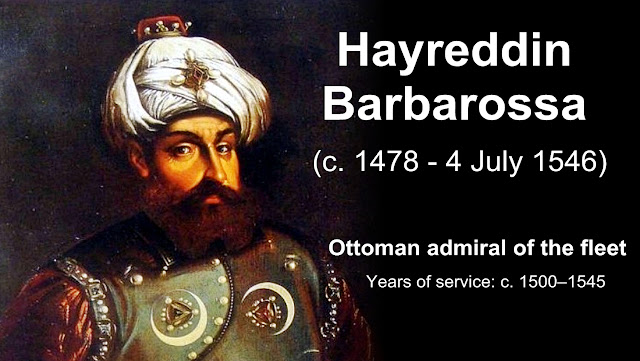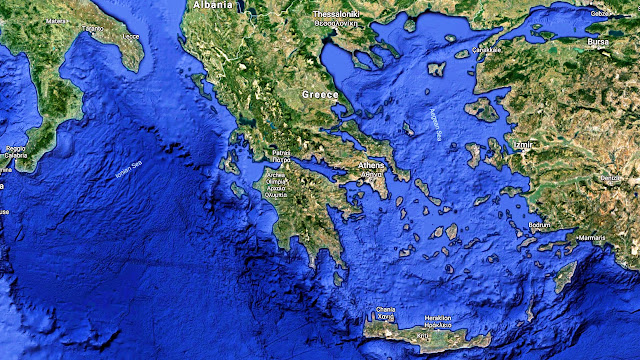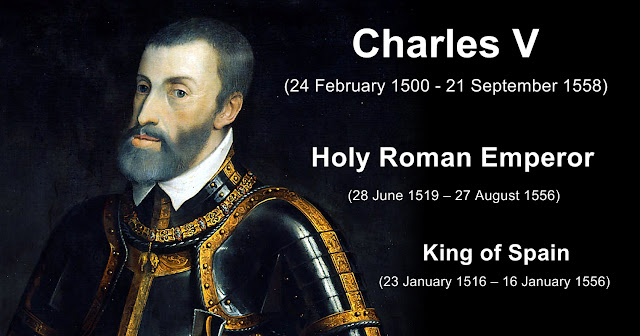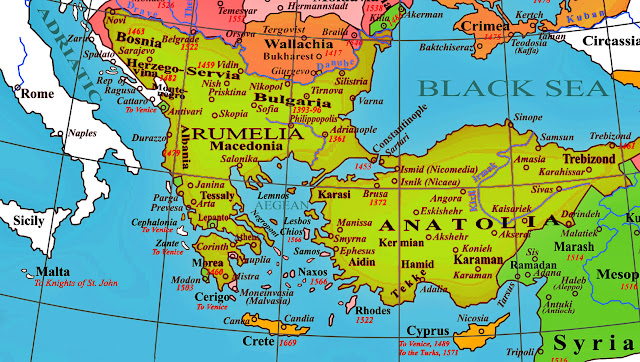Monday, April 10, 2023
Battle of Preveza, 1538
The Battle of Preveza was a naval battle that took place on 28 September 1538 near Preveza in northwestern Greece between an Ottoman fleet and that of a Christian alliance assembled by Pope
Paul III in which the Ottoman fleet defeated the allies. It was one of the three largest sea battles that took place in the sixteenth century Mediterranean.
In 1537, commanding a large Ottoman fleet, Hayreddin Barbarossa captured a number of Aegean and Ionian islands belonging to the Republic of Venice, namely Syros, Aegina, Ios, Paros, Tinos, Karpathos, Kasos and Naxos, thus annexing the Duchy of Naxos to the Ottoman Empire. He then unsuccessfully besieged the Venetian stronghold of Corfu and ravaged the Spanish-held Calabrian coast in southern Italy.
In the face of this threat, Pope Paul III succeeded in February 1538 in assembling a Holy League, comprising the Papacy, Spain, the Republic of Genoa, the Republic of Venice and the Knights of Malta, to confront Barbarossa.
Barbarossa's fleet that summer numbered 122 galleys and galliots. That of the Holy League comprised 400 galleys and galleons (55 Venetian galleys, 61 Genoese and Papal, 10 sent by the Knights Hospitaller and 50 by the Spanish). Andrea Doria, the Genoese admiral in the service of Emperor Charles V was in overall command.
The Holy League assembled its fleet near the island of Corfu. Barbarossa was still at the island of Kos in the Aegean Sea at that time, but he soon arrived at Preveza with the rest of the Ottoman fleet, after capturing the island of Kefalonia on the way.
Sinan Reis, one of his lieutenants, suggested landing troops at Actium on the Gulf of Arta near Preveza, an idea that Barbarossa initially opposed, but which later proved to be important in securing the Ottoman victory. With the Turks holding the fortress at Actium, they could support Barbarossa's fleet with artillery fire from there, while Doria had to keep his ships away from the coast. A Christian landing to take Actium probably would have been needed to ensure success, but Doria was fearful of a defeat on land after an initial sortie had been repelled.
As Doria's ships kept their distance from the coast, much concerned about adverse winds driving them onto a hostile shore, Barbarossa had the advantageous interior position. During the night of 27–28 September, Doria therefore sailed 30 miles south and, when the wind died down, anchored at Sessola near the island of Lefkada.
During the night, he and his commanders decided that their best option was to stage an attack towards Lepanto and force Barbarossa to fight.
At dawn, however, Doria was surprised to see that the Turks were coming towards his ships. Barbarossa had taken his fleet out of the anchorage and headed south as well.Not expecting such a daring offensive from the numerically inferior Ottoman fleet, it took Doria three hours to give the order to weigh anchor and ready for battle.
Barbarossa wanted to take advantage of the lack of wind which immobilized the Christian barques that accounted for most of the numerical difference between the two sides. These barques fell as
easy prey to the Turks who boarded them from their relatively more mobile galleys and galliots. Doria's efforts to trap the Ottoman ships between the cannon fire of his barques and galleys failed.
At the end of the day, the Turks had sunk 86 ships, burned 48 others, captured 36, and had taken about 8,000 prisoners. The Turks did not lose any ships but suffered 400 dead and 800 wounded. A number of Ottoman ships had been seriously damaged, however.
The next morning, with favorable wind, and unwilling to risk the Spanish-Genoese ships, Doria set sail and left the battlefield for Corfu, deaf to the pleas of the Venetian, Papal and Maltese commanders to continue the fight.
A peace treaty was signed between Venice and the Ottoman Empire in October 1540, under which the Turks took control of the Venetian possessions in the Morea and in Dalmatia and of the formerly Venetian islands in the Aegean, Ionian and eastern Adriatic Seas. Venice also had to pay a war indemnification of 300,000 ducats of gold to the Ottoman Empire.The Ottoman supremacy in large-scale fleet battles in the Mediterranean Sea remained unchallenged until the Battle of Lepanto in 1571.








